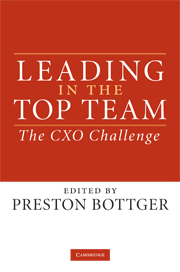Book contents
- Frontmatter
- Contents
- Figures
- Tables
- Contributors
- Editor's Acknowledgments
- 1 Introduction – Leading within and across the functions
- Section I The Business Imperatives
- 2 The Leadership Imperative – Driving wealth creation
- 3 The Talent Imperative – All CXOs must strengthen the company's talent pool
- 4 The Learning Imperative – Going offline to improve performance
- Section II The CXOs: Within the Functions
- Section III The CEO and the Leadership Team – Pulling it all together
- Conclusion
- Index
- References
4 - The Learning Imperative – Going offline to improve performance
Published online by Cambridge University Press: 19 August 2009
- Frontmatter
- Contents
- Figures
- Tables
- Contributors
- Editor's Acknowledgments
- 1 Introduction – Leading within and across the functions
- Section I The Business Imperatives
- 2 The Leadership Imperative – Driving wealth creation
- 3 The Talent Imperative – All CXOs must strengthen the company's talent pool
- 4 The Learning Imperative – Going offline to improve performance
- Section II The CXOs: Within the Functions
- Section III The CEO and the Leadership Team – Pulling it all together
- Conclusion
- Index
- References
Summary
The main constraint on improvement is not budgets so much as the relentless insistence on meeting short-term targets.
(CXO, international semiconductor manufacturer)Within companies, learning has long been associated with individual training and development and seen as a responsibility for the HR function. But the demands for business improvement over the past several decades have made clear that learning must occur on-the-job in real time, and must involve teams and even large groups of people.
For example, by the 1980s, the total quality movement was playing a significant role in promoting a broader understanding that effective business learning is a collective endeavour. This approach stressed the need for continuous improvement and process enhancement implemented by people throughout the business system.
In the 1990s, learning practices were further enriched by the new concern with knowledge management. The IT function increasingly focused on ways of accessing and leveraging existing data and information within the company. Meanwhile the R&D, marketing and production functions were discovering how to learn from the organizing and technological capabilities of strategic partners and competitors.
Thus, the practicalities and challenge of learning have broadened and deepened in recent decades. The learning imperative has moved beyond the confines of HR training programmes to involve all functions. Learning – that is, application of results-from-experience and newly invented or borrowed methodologies – is essential at individual, team and company level.
Earlier focus on curriculum content and course design has given way to renewal and design of the business system – a broader scope.
- Type
- Chapter
- Information
- Leading in the Top TeamThe CXO Challenge, pp. 52 - 68Publisher: Cambridge University PressPrint publication year: 2008



